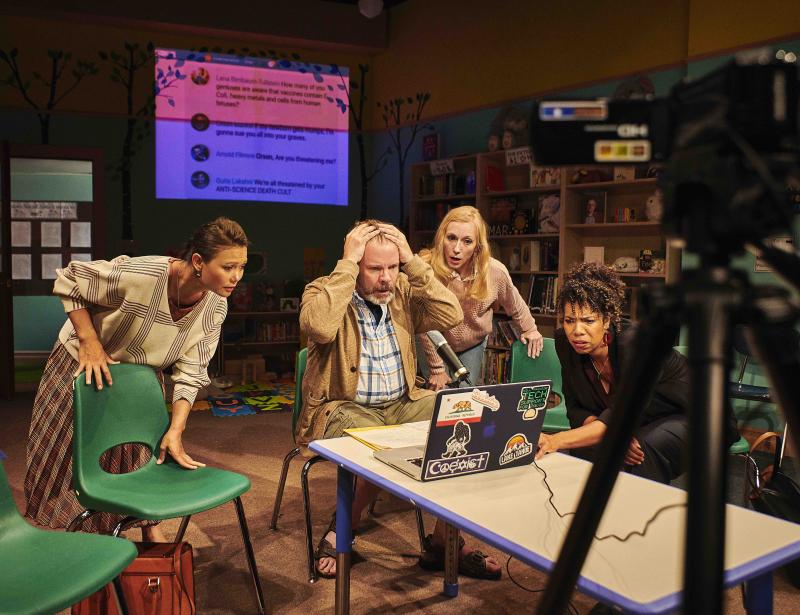Review: A Vaccination Debate Fuels Jonathan Spector's Sharp and Empathetic Social Commentary EUREKA DAY
A wildly funny first act evolves into something more poignant in the second.
Sure, it's a bit early in the game, but what might turn out to be the funniest scene to hit New York stages in this young theatre season occurs at the end of the first act in Jonathan Spector's sharp and empathetic social commentary, EUREKA DAY.

and Elizabeth Carter (Photo: Robert Altman)
The set-up is that the Eureka Day School in Berkeley, California has been quarantined because a student has come down with the mumps. Though the state passed a law requiring immunization, children whose parents filed a waver during the grace period can remain unvaccinated.
So the five members of the decidedly progressive school's Executive Committee, who make all decisions by consensus and respect every opinion as having equal value, hold a town hall meeting with parents via Facebook Live. As the committee gathers around a laptop, trying to explain options in calming tones, the audience can see projections of posts made by parents.
At first, it's innocuous chatter and the occasional thumbs up, but when it becomes apparent how divided the parents are between those who immunize their children and those who don't, the posts become more and more vicious.
"Do what you want, just keep your POISON off my kids."
"We're all threatened by your ANTI-SCIENCE DEATH CULT."
"Big Pharma is the REAL death cult."
"Remember that time I got crippled from polio? Oh, no wait. I didn't. Cause I got f-ing VACCINATED."
When all voices are allowed to be heard, oftentimes nobody's listening.
Originally produced by Berkeley's Aurora Theatre Company, and now receiving a terrifically acted production directed by Adrienne Campbell-Holt, artistic director of the theatre company Colt Coeur, EUREKA DAY is the latest, and in this reviewer's opinion the best, of that 21st Century Theatre genre that might be called Comedy of White Liberals Overcompensating For Their Privilege Manners. (Larissa Fasthorse's THE THANKSGIVING PLAY and Joshua Harmon's ADMISSIONS have been recent examples to hit Off-Broadway.)
Nearly every scene is set during a committee meeting in the school's library (John McDermott's excellent, realistic set has those adorable tiny chairs for kids), where all books are donated by parents and categorized as fiction, non-fiction or social justice.
As the play begins, the Executive Committee is discussing which racially descriptive terms to include in a form for prospective parents, weighing the potential to offend for any term's inclusion or exclusion.
This is a school that focuses on developing kind and empathetic students, even if it means they're behind their peers academically. The soccer team cheers when the other team scores a goal, gender-specific pronouns are forbidden and a school production of PETER PAN was reset to outer space in order to eliminate any suggestion of support for colonization of indigenous land.
Of course, there's nothing wrong with expressing empathy, but what makes the first act so consistently funny is the depiction of the committee's three white members dominating discussions where potential offences against the marginalized are dissected to the smallest detail while the two members of color seem more apt to apply common sense.
.jpg)
Thomas Jay Ryan and KK Moggie
(Photo: Robert Altman)
Perpetually grinning in the face of adversity, committee head Don, as played by Thomas Jay Ryan, is a walking embodiment of "kindly." Stage gem Tina Benko gives another one of her outstanding performances as the assertive Suzanne, a "forceful advocate" who seems to wear her wokeness as a fashionable accessory. Tech millionaire Eli (Brian Wiles) is a conscientious ally who is oblivious to his sexist behavior.
As the above white trio dominates discussion, Meiko (K.K. Moggie) described by the playwright as biracial Japanese/white, spends meetings calmly knitting and not getting too emotionally involved. New member Carina (Elizabeth Carter), who is black, seems happy to sit and learn at first, but eventually realizes that asserting herself may be the only way to get things done in this toxically compassionate atmosphere.
After a satirical first half, the second act begins addressing the issue of vaccination more seriously as matters get more personal for the committee members. Spector and Campbell-Holt do an impressive job of gliding the piece into moments of poignancy. The laughs are still there, but they evolve into more realistic, character-based comedy.
And when Benko gives a devastating performance in a dramatic scene where Suzanne explains why she holds the position she does in regards to vaccination, EUREKA DAY shows itself as a play that asks us to consider the power that emotions have to defy what science has proven as fact.
Comments
Videos

